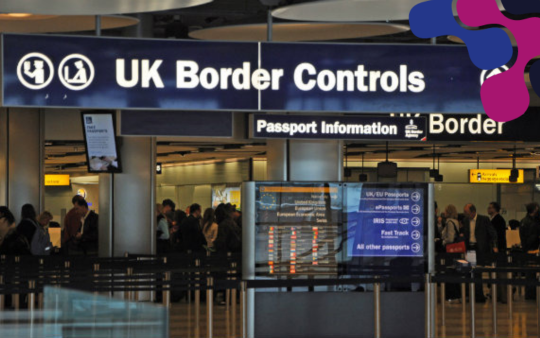5 Steps To Check Your Job Applicant’s Right To Work In The UK
Hiring a new team member is exciting, but it comes with legal responsibilities. One of the biggest? Ensuring every employee, without exception, has the right to work in the UK. Skipping this step—or thinking it only applies to certain employees—could land you in serious trouble. Since October 2022, EU citizens no longer have automatic rights to work in the UK, and penalties for non-compliance are steeper than ever. This month, two UK businesses were fined up to £75,000 each for failing to check employees’ right-to-work documentation.
Follow this five-step process to keep your business compliant, protect yourself from penalties, and ensure that you have the required documentation for every single employee.
1. Request Right to Work Documents from All New Employees
First, ask every job applicant for official documents to confirm they’re eligible to work in the UK. You’ll need to follow this step for all employees, whether they’re full-time, part-time, or temporary, and regardless of their background or nationality.
Here’s what to look for in their documentation:
- Original Document: You must see the original document in person, not a photocopy or scanned copy.
- Photograph: Verify that the photo matches the applicant.
- Expiry Date: Make sure the document is valid.
- Date of Birth: Double-check against other documents you’ve received.
- Names and Signatures: Confirm these match across documents.
- Endorsements and Stamps: Be aware of any restrictions on the type of work or visa conditions.
For some visa holders, such as spouses, you may need additional proof that they live with the visa holder. Ensuring these checks for every employee will protect your business and demonstrate that you’re consistent and thorough in your hiring processes.
2. Make and Sign Copies of All Documentation
Once you’ve checked the original documents, make a photocopy of:
- The passport’s front page showing personal details.
- Any pages with government stamps or endorsements for work eligibility.
- The applicant’s signature page.
It’s essential that you sign and date each photocopy to show that you reviewed the original documents in person. This isn’t just a formality—having your signature and date on file helps prove that you followed the correct procedures if your records are audited.
Store these copies securely in each employee’s file, whether it’s digital or physical. And remember, it’s crucial that you do this for every single employee, not just those you believe might need it. Making assumptions can lead to oversight, which could result in costly fines.
3. Store and Review Documents Regularly
Compliance doesn’t end after you’ve taken copies. You’ll need to keep all right-to-work documents on file for each employee and set up regular reviews, especially for anyone with a time-limited visa. Make a checklist or set calendar reminders for renewal dates so that you’re prepared to review and update documentation as necessary.
Keeping this documentation current is just as important as gathering it at the start. Not keeping records up-to-date for all employees is one of the main reasons businesses face fines. As mentioned, the recent penalties on UK businesses show that enforcement is only getting stricter, and ensuring consistency across your workforce is the best way to stay compliant.
4. Stay Informed on Post-Brexit Rules and Updates
Since Brexit, EU citizens no longer have automatic rights to work in the UK. As of October 2022, all foreign nationals, including EU citizens, require a valid visa or settled status to be employed. If you’ve been relying on past rules or overlooking EU applicants, it’s time to update your process.
Keep an eye on immigration policy changes, as regulations can shift with little notice. Check the latest guidelines at gov.uk. Staying informed will prevent last-minute scrambles and help you avoid fines.
5. Conduct Checks Before Employment Begins
The law requires that right-to-work checks are completed before a new employee’s first day. This is non-negotiable. Even if you collect documentation after the fact, you’re still liable for fines if the checks weren’t done beforehand. Make it a part of your hiring process to conduct checks for all applicants well before they start work.
The recent high-profile fines for non-compliance—like the £75,000 penalties imposed on two UK companies—show how crucial this is. Failure to meet these requirements puts your business at risk, regardless of its size or industry. So, even if you’re only hiring part-time or temporary staff, these checks are essential.

The Importance of Documenting Right-to-Work Checks for Every Employee
Employing anyone without proper right-to-work documentation, regardless of their role or hours, could lead to hefty fines, legal trouble, and reputational harm. Additionally, hiring without proper checks may inadvertently support exploitative practices if undocumented employees face unfair conditions. By following a consistent process for every hire, you’re not only staying compliant but also promoting a fair and lawful workplace.
Additional Resources and Support
Right-to-work compliance can be complex, especially if you’re balancing this with other business responsibilities. That’s why we offer a free HR Health Check at Kate Underwood HR & Training. We’ll review your practices, help you organize your documentation, and ensure your processes meet legal standards. For ongoing support, our service plans provide continuous compliance checks and HR assistance, giving you peace of mind without surprise costs.
For more information on the latest right-to-work requirements and to review acceptable documents, visit gov.uk.
Right-to-Work Checklist for All Employees
To make this easy to remember, here’s a quick compliance checklist:
- Ask for original right-to-work documentation from every employee, regardless of nationality or position.
- Photocopy and securely store all documents, signed and dated by you.
- Set reminders to review time-limited visas before expiry.
- Keep up-to-date with changing rules, particularly those impacting EU nationals post-Brexit.
- Complete checks before the employee’s first day to avoid fines and penalties.
By following these steps for all employees, you’ll be safeguarding your business, staying compliant, and promoting a lawful workplace. Right-to-work compliance is a requirement for every single employee—no exceptions.

